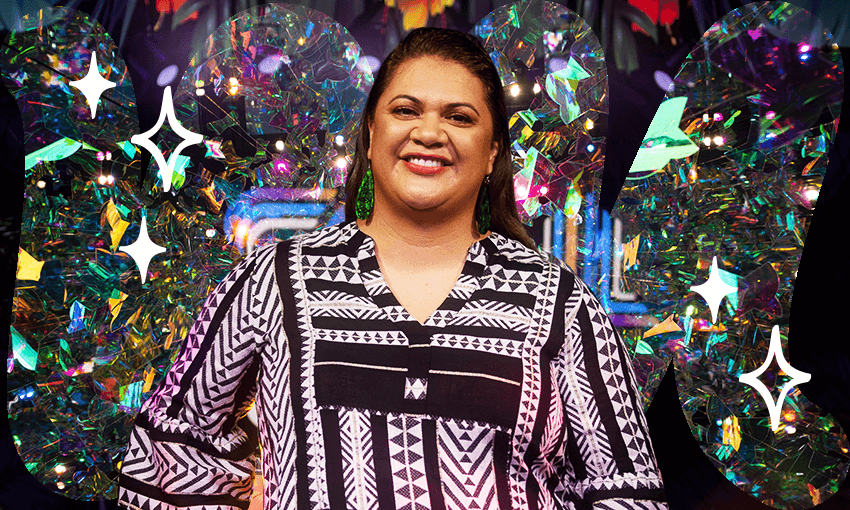The gospel music show’s second season is out now, against the odds. Host Sara-Jane Elika tells Sela Jane Hopgood what it took to get the first episode to air after omicron threw the production schedule into disarray.
Filming for season two of gospel show Soul Sessions was supposed to take four days in February. Four days, 10 episodes.
The pandemic knocked on the studio doors on day two.
Soul Sessions is a half-hour television show that celebrates the popular genre of gospel music, hosted by New Zealand Sāmoan singer Sara-Jane Elika (née Auva’a), who sang in the pop group Pacific Soul before going solo. The show explores the gospel music scene in Aotearoa and features soul and gospel musicians, with each episode concluding with a live duet with Elika.
After a successful first season that included Breakfast newsreader Indira Stewart and award-winning Pacific artists Lani Alo, TJ Taotua and La Coco, the show received funding from New Zealand On Air for a second season as well as a one-off Christmas special last year. The cast and production team had a short turnaround from the announcement of the funding to produce and air their Christmas episode – just two weeks, in fact.
That short turnaround would end up repeating itself for the whole of season two.
The team behind the show hoped to get through production unscathed, but were prepared for the worst. “We’re very fortunate to be sponsored by Pasifika Medical Association, so they provided us with all the health and safety equipment including RATs, N95 masks and an on site medic,” Elika says.
“On the second day of filming, one of our crew members went through our routine protocol of doing a RAT and tested positive and so that member had to get a PCR done. While that was happening, all who were present that day, we had a meeting and decided to shut down production until further notice.”
Elika said it was a tough few weeks during February and March as Auckland’s omicron wave intensified. A number of artists fell ill and could no longer be a part of the show, so Elika and her team went through a big roll call of musicians to fill the gaps. “I really believe that everyone that’s in our second season is meant to be on the show,” she says, reflecting on what has been a rollercoaster of events for Soul Sessions.
That includes catching Covid herself, along with her household – her husband, four children and her father-in-law. “I didn’t test positive for six days since production shut down and when I did, my symptoms were mild, so when I did feel better it was back into mum mode, not just for my family, but also the wider production team,” she laughs. Elika and others organised food parcels to be delivered to members of the team who tested positive – around 70% of the season two team either had Covid or was a close contact over the past two months. “It became a waiting game, making sure everyone on our team had fulfilled their isolation period and were fully recovered to then look at resuming production for the show,” she says.
The week starting April 4 – around six weeks after filming was supposed to have wrapped – the cast and crew returned to the studio to film the remaining episodes for the season. For a show planned to air on April 17, that’s an extremely tight turnaround. “There’s one episode where I was jamming with a group of teenagers and the recording went right up until midnight,” Elika recalls. “That was the sacrifice we had to make to ensure the show was ready for Easter.”
It required the patience of a saint in order to tick off the episodes one by one. “The entire crew and the musicians on board were just incredibly understanding and we managed to pull off over 30 songs this season, from traditional hymns to well-known gospel songs, sung in multiple languages such as te reo Māori, Tongan, Sāmoan. That wouldn’t have been possible without the resilience of the whole team,” Elika says.
The artists in season two hail from all over – Kaitaia, Gisborne, Tāmaki Makaurau – and includes Evile Laloata from The Voice Australia, Tone 6 and Andrew Faleatua. The show is airing on Shine TV, Prime and Māori Television. Episode one, which launched on Easter Sunday, featured Nick Afoa from the stage show The Lion King, who discussed his music career and shared a bit about his Croatian and Sāmoan heritage.
On the last day of filming, the entire cast came together to sing Mary Mary’s ‘Can’t Give Up Now’. “The lyrics of the second verse read: Never said there wouldn’t be trials, never said that everything would go, I feel all hope is gone, I’ll just lift my head up to the sky and say help me to be strong… It just hit me because of the journey we’ve all been through,” says Elika.
Each day of April she was on the edge, wondering if there would be another outbreak within their circle. “It took a toll on me as an executive producer, ensuring health and safety was met on and off stage, checking in on the wellbeing of the team. There were around 45 people on set, so as we belted out Mary Mary’s song, we just felt this sense of relief and joy that we were able to complete the show,” Elika says. “We’re really a show that beat the odds.”
Public Interest Journalism funded through NZ On Air.



